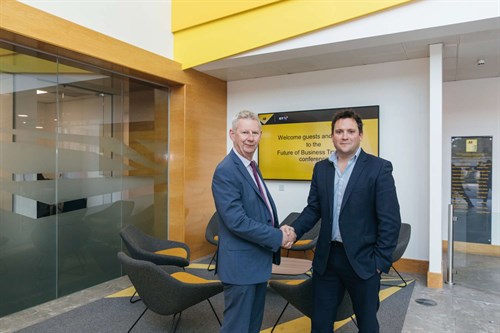- Further 4.25t electric van rule changes under consideration
- Arval research uncovers van fleet optimism
- Pre-orders open for new Nissan Interstar
- More than half of UK van drivers now believe EVs more cost effective than ICE, VW finds
- Public EV charging costs preventing adoption for some fleets, AFP says
- Ford Ranger Tremor review
- Inseego awarded Crown Commercial Service framework status
- ADVERTISEMENT FEATURE: Electrify and optimise: Digital solutions at the forefront of decarbonisation
- Fleets being pushed to take electric vans due to ZEV mandate, AFP reports
- Buying a used... Citroen Relay (2019)
NEWS ANALYSIS: The devil is in the detail
Date: Thursday, May 30, 2019 | Author: James Dallas

The AA’s Edmund King (left) with BT Fleet’s Henry Brace
(Continued from previous page) Edmund King, AA president, pointed out London councils have also acted unilaterally, with Hackney and Camden each introducing zero emission streets within their boroughs in moves not related to Transport for London’s ULEZ.
The dilemma for van operators, according to Brace, is that while people will always say they want cleaner air the explosion in dotcom deliveries is driving more vans into cities.
Customers, however, do not want to pay more for their deliveries to cover the extra costs to operators entailed by switching to greener vans or paying congestion charges. Brace predicted a backlash will come when these costs are passed on to consumers.
So the challenge is to meet demand while lowering the carbon footprint and to this end BT Fleet has pledged 85% of its fleet will be ultra-low emission by 2030.
Beth Dawson, major projects manager at Fuel Cell Systems, argued that despite advances in diesel engine technology, it is “proven that poor air quality is always bad”, (according to the World Health Organisation) and that getting rid of diesel “is worth it”.
Dawson made the case for developing hydrogen-powered vehicles and renewable energy alongside battery electric vehicles by pointing out that charging too many plug-in vehicles at the same time in a residential area would be likely to cause a power failure.
Gary Harrison, head of engineering at BT Fleet Solutions, believes changes in legislation will ultimately drive change in fuel use, as was the case in the 1980s when diesel became dominant.
Harrison concured that the DfT passed on responsibility for establishing CAZ to local authorities, many of whom viewed it as a money–making opportunity. Stuart Thomas, director of Fleet and SME for the AA, said the question van operators must answer is how fewer vehicles can deliver more goods. Hubs outside cities where electric vans collect deliveries could help but, as Harrison said: “It’s not just a final mile parcel delivery problem.”
What happens when the van is permanently equipped as an engineer’s place of work and needs to travel long distances?
“A broadband fix can’t be final mile,” he said, “the van is a workshop.”
Manufacturers such as Ford, with its PHEV Transit Custom, believe hybrids could provide a solution. The AA’s King said operators working in central London must work out whether it is more cost effective to buy new Euro6 or alternative fuel vans or to pay the £12.50 daily ULEZ charge. King and Brace agreed that the expanded ULEZ, due to come into force in 2021, will be the game changer for LCV fleets as it is set to be 18 times the size of the current zone, which follows the boundaries of the London Congestion Charge area.
“Small businesses running a van will be hit hard,” said Brace, “you can’t charge customers £12.50 more [per job].” As for large national fleets, he says they will move their non- ULEZ or CAZ compliant vans to rural areas where the emission conditions do not apply.
View The WhatVan Digital Edition


